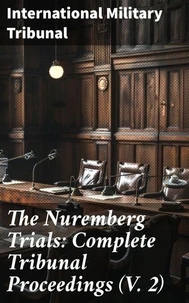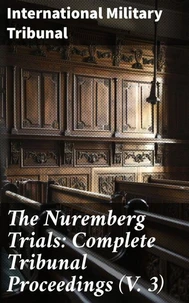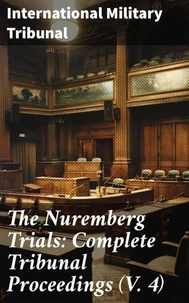The Nuremberg Trials (Volume 3)
Par :Formats :
Disponible dans votre compte client Decitre ou Furet du Nord dès validation de votre commande. Le format ePub est :
- Compatible avec une lecture sur My Vivlio (smartphone, tablette, ordinateur)
- Compatible avec une lecture sur liseuses Vivlio
- Pour les liseuses autres que Vivlio, vous devez utiliser le logiciel Adobe Digital Edition. Non compatible avec la lecture sur les liseuses Kindle, Remarkable et Sony
 , qui est-ce ?
, qui est-ce ?Notre partenaire de plateforme de lecture numérique où vous retrouverez l'ensemble de vos ebooks gratuitement
Pour en savoir plus sur nos ebooks, consultez notre aide en ligne ici
- Nombre de pages583
- FormatePub
- ISBN859-65--4740409-5
- EAN8596547404095
- Date de parution13/11/2022
- Protection num.Digital Watermarking
- Taille767 Ko
- Infos supplémentairesepub
- ÉditeurDIGICAT
Résumé
The Nuremberg Trials (Volume 3) is a compelling documentary account of the groundbreaking legal proceedings held in the aftermath of World War II, capturing the complex interplay of law, morality, and justice. This volume delves into the detailed testimonies and evidence presented against key Nazi leaders, highlighting a meticulous literary style that marries legal documentation with a narrative flow that engages the reader.
The context of the trials reflected a pivotal moment in international law, as the tribunal sought to establish a precedent for prosecuting war crimes and crimes against humanity, intertwining historical accuracy with a profound moral imperative. The International Military Tribunal, comprised of judges and prosecutors from the Allied powers, brought together diverse perspectives shaped by the trauma of war and the desire for justice.
Their motivations stemmed from a collective commitment to accountability, aiming to confront the atrocities committed during the Holocaust and other war crimes. The multifaceted nature of their backgrounds-legal, military, and political-brought a unique depth to the proceedings, underscored by their quest for a universally applicable standard of justice. This volume is essential for anyone seeking to understand the foundations of contemporary war crimes legislation and the ethical considerations surrounding justice in the wake of atrocity.
It is particularly relevant for scholars, historians, and legal practitioners interested in international law, human rights, and the historical significance of the trials, inviting readers to reflect on the enduring conflict between power and responsibility.
The context of the trials reflected a pivotal moment in international law, as the tribunal sought to establish a precedent for prosecuting war crimes and crimes against humanity, intertwining historical accuracy with a profound moral imperative. The International Military Tribunal, comprised of judges and prosecutors from the Allied powers, brought together diverse perspectives shaped by the trauma of war and the desire for justice.
Their motivations stemmed from a collective commitment to accountability, aiming to confront the atrocities committed during the Holocaust and other war crimes. The multifaceted nature of their backgrounds-legal, military, and political-brought a unique depth to the proceedings, underscored by their quest for a universally applicable standard of justice. This volume is essential for anyone seeking to understand the foundations of contemporary war crimes legislation and the ethical considerations surrounding justice in the wake of atrocity.
It is particularly relevant for scholars, historians, and legal practitioners interested in international law, human rights, and the historical significance of the trials, inviting readers to reflect on the enduring conflict between power and responsibility.
The Nuremberg Trials (Volume 3) is a compelling documentary account of the groundbreaking legal proceedings held in the aftermath of World War II, capturing the complex interplay of law, morality, and justice. This volume delves into the detailed testimonies and evidence presented against key Nazi leaders, highlighting a meticulous literary style that marries legal documentation with a narrative flow that engages the reader.
The context of the trials reflected a pivotal moment in international law, as the tribunal sought to establish a precedent for prosecuting war crimes and crimes against humanity, intertwining historical accuracy with a profound moral imperative. The International Military Tribunal, comprised of judges and prosecutors from the Allied powers, brought together diverse perspectives shaped by the trauma of war and the desire for justice.
Their motivations stemmed from a collective commitment to accountability, aiming to confront the atrocities committed during the Holocaust and other war crimes. The multifaceted nature of their backgrounds-legal, military, and political-brought a unique depth to the proceedings, underscored by their quest for a universally applicable standard of justice. This volume is essential for anyone seeking to understand the foundations of contemporary war crimes legislation and the ethical considerations surrounding justice in the wake of atrocity.
It is particularly relevant for scholars, historians, and legal practitioners interested in international law, human rights, and the historical significance of the trials, inviting readers to reflect on the enduring conflict between power and responsibility.
The context of the trials reflected a pivotal moment in international law, as the tribunal sought to establish a precedent for prosecuting war crimes and crimes against humanity, intertwining historical accuracy with a profound moral imperative. The International Military Tribunal, comprised of judges and prosecutors from the Allied powers, brought together diverse perspectives shaped by the trauma of war and the desire for justice.
Their motivations stemmed from a collective commitment to accountability, aiming to confront the atrocities committed during the Holocaust and other war crimes. The multifaceted nature of their backgrounds-legal, military, and political-brought a unique depth to the proceedings, underscored by their quest for a universally applicable standard of justice. This volume is essential for anyone seeking to understand the foundations of contemporary war crimes legislation and the ethical considerations surrounding justice in the wake of atrocity.
It is particularly relevant for scholars, historians, and legal practitioners interested in international law, human rights, and the historical significance of the trials, inviting readers to reflect on the enduring conflict between power and responsibility.





